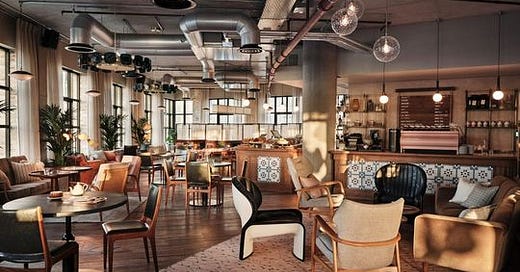Hotels Get Hospitality But Do They Get Coworking?
I decided to write this article as we regularly talk about why hotels should open coworking spaces. Many people think so because 'they get hospitality'. However there is more to consider than just that.
Anyone that knows me will know that I am a great advocate for hotels to enter the coworking industry, having developed Working From_The Hoxton for Ennismore. It makes great sense to me and I can see that many hotel brands would benefit from entering the industry but it isn't for everyone.
So, do hotels get coworking?
Not all, it really wouldn't work or be of interest to a budget style of hotel that has a low touch point approach and little support to make the experience worth considering.
It will work for the lifestyle brand of hotel. Obviously The Hoxton sits in this bracket and it was a clear move for them as they say they have unofficially been doing coworking since 2006.
This is because of the open lobby approach that hotels such as The Hoxton and previously Ace Hotel conceptualised.
This is known as Lobby Culture.
What is Lobby Culture?
Lobby Culture is basically the idea of defiantly blurring the line between private and public space. It is where we would cater for the customers of the space but also open the doors to the community that surrounds it.
It is a dynamic, multifunctional space, where people can stay, work, eat and drink and socialise all under one roof.
By catering to the above the hotel is effectively catering for two types of customer, unlike the budget brand.
The two types of customer are:
Hotel Guest - Someone that has booked a room.
Local - Someone that lives locally and uses the social spaces of the hotel.
For many years a hotel only used to cater for the hotel guest but that closes off a massive revenue stream.
So, for those hotel brands that put importance in the local community then yes, they would get coworking and really should consider entering the market.
When coworking compliments the hotel
By developing a coworking brand that compliments the hotel brand they can open themselves not only to more revenue but it also widens the approach to acquisitions of potential buildings.
Typically, a hotel brand will have a remit of how many rooms the hotel needs and they would not really want to extend on this. Some brands look at around the 200 room range. So, if a building that is of interest but is just that bit too large, then adding in a coworking offering on a number of the floors is a great solution.
If the coworking concept expands to other hotels in the brand it will eventually grow to the stage where it can stand as a brand alone and not only grow hand in hand with the hotel brand but also as a stand alone offering.
How do hotels develop their own coworking offering?
This would be different for every brand but it would be worthwhile to consider the following:
You will use a different PMS and booking system to that used in a hotel but want one with open API to sync with your accounting system.
The same will go with your POS system, this will ideally integrate with the PMS system to push fees or charges to the member account.
One of the main differences to consider is the security and power of the wifi available. It needs to be separate from the hotel and more secure for the companies that will occupy your space. It also needs to be failsafe and hopefully rarely go down. So, a contingency should be considered to run side by side your main provider.
20,000 to 50,000 sq ft of space will allow you to develop an offering that will appeal to the market.
You will need to develop a sales strategy that includes the aggregator and broker market.
Consider a ratio of around 8 square metres per person (this covers breakout space, lounge, members bar, meeting rooms etc)
There is of course much more to consider than just the six points above but it is a start.





